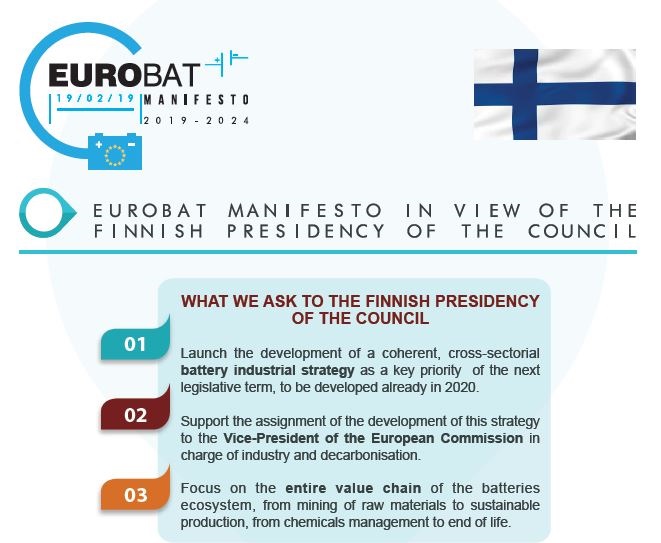EUROBAT Manifesto in view of the Finnish presidency of the Council

What we ask to the Finnish Presidency of the Council
1 – Launch the development of a coherent, cross-sectorial battery industrial strategy as a key priority of the next legislative term, to be developed already in 2020
2 – Support the assignment of the development of this strategy to the Vice-President of the European Commission in charge of industry and decarbonisation
3 – Focus on the entire value chain of the batteries ecosystem, from mining of raw materials to sustainable production, from chemicals management to end of life.
Batteries are critical to decarbonise our economy and tackle climate change: from electric mobility to energy storage, from grid stabilisation to logistic, batteries will support the decarbonisation of the transport, energy, production and telecommunications sectors. All battery technologies - lead, lithium, nickel and sodium - are needed to do so. No single battery technology can meet all the challenges of end-user demands and combine high power and energy density, long life, low cost, excellent safety and minimal environmental impact. Together, all battery technologies will lead Europe towards a decarbonised economy.
Europe must take the lead in designing and building the most environmentally sustainable energy storage solutions and supporting the development of its battery industry. To succeed, it will be paramount to look at the entire value chain of the batteries ecosystem, from mining of raw materials to sustainable production, from chemicals management to end of life. Secure access to raw materials, in particular, will be fundamental: Europe needs to look both internally, supporting mining of valuable materials in Europe, and externally, through trade deals with international partners. Circular economy principles can also support this target, ensuring high levels of recycling to recover valuable materials.
The development of a coherent, cross-sectorial battery industrial strategy is therefore urgently needed. Finland will hold the first presidency of the Council of the new legislative term, and will play a key role in setting the agenda for the next five years.
The efforts of the Juncker Commission in the development of the European Battery Alliance clearly demonstrate how coordination at Commission level is needed to develop cross-sectorial industrial strategies. For the next term, we believe that the development of a coherent battery industrial strategy should be a key point in the portfolio of assignments of the Vice-President of the European Commission in charge of industry and decarbonisation. The Vice-President should ideally supervise the work of different Directorates General, including Industry, Transport, Energy, Climate, Environment and Employment. Similarly, Council and Parliament must work on the development of this strategy across different sectors, identifiying key political leaders to support it.
Coherence is also a key pre-requisite. Different initiatives at European level affecting the battery sector must be developed together in a coherent way, avoiding separate initiatives resulting in a contradictory framework. For this reason, we urge the Commission to treat the Batteries Directive, the End of Life Vehicles Directive, the sustainability criteria for batteries and other related initiatives as a single coherent package, and to release them together in a European Battery Package.
Finally, we cannot afford to lose time: international competition is fierce, and Europe risks to lag behind in this highly strategic sector. Coherence and speed will be fundamental to ensure the success of the Industrial Battery Strategy. For this reason, we call the European Commission to develop and release the Battery Package as a key priority of the next legislative term, already in the course of 2020.